- Home
- Bette Lee Crosby
Beyond the Carousel
Beyond the Carousel Read online
Beyond the Carousel
Wyattsville Series
Book Five
BETTE LEE CROSBY
BEYOND THE CAROUSEL
Wyattsville Series, Book Five
Copyright © 2017 by Bette Lee Crosby
Cover design: damonza.com
Formatting by Author E.M.S.
Editor: Ekta Garg
All rights reserved. No part of this publication may be reproduced or transmitted in any form by any means, electronic or mechanical, including photocopy, recording, or information storage and retrieval system without permission in writing from the author, except by reviewers who may quote brief passages for a review to be printed in a newspaper, magazine or journal.
This is a work of fiction. While, as in all fiction, the literary perceptions and insights are based on life experiences and conclusions drawn from research, all names, characters, places and specific instances are products of the author’s imagination and used fictitiously. No actual reference to any real person, living or dead, is intended or inferred.
ISBN-978-0-9969214-7-3
BENT PINE PUBLISHING
Port Saint Lucie, FL
Published in the United States of America
Table of Contents
Title Page
Copyright
A Free Gift…
Books by Bette Lee Crosby
BEYOND THE CAROUSEL
Emory Hawthorne
The Early Years
The Following Sunday
Rose Hawthorne
Frivolous Things
Today is Tomorrow
Rose
The Parlor
A Change of Heart
After Lunch…
A Season of Love
Franklin Wilkes
Happily Married
Promise of Prosperity
Highs & Lows
Franklin
Dark Days
Revenge
A Widow’s Tears
Laura Wilkes
The Years That Followed
Piece by Piece
A Time of War
An End of an Era
Christine Wilkes
The Legacy
The Boarding House
Christine
The Strike
Getting to Know You
The Ball Game
Christine
At the Algonquin
The Dinner Party
Emory
The Elks Club
The Following Months
The Wedding
New Beginning
Christine
The Big Move
Emory
All Good Things
A Family Life
An Overdue Opportunity
Christine
Trading Places
Apartment Dwelling
Emory
A Place Called Home
Cold Case
Inside the Box
Jack Mahoney
Needle in a Haystack
End of the Road
Emory
A note from the Author
Wyattsville Series books
More Books by Bette Lee Crosby
About the Author
A Free Gift…
Welcome to Wyattsville. If you’d like to know more about the characters in this and several of Bette Lee Crosby’s other novels, CLICK HERE to download a free copy of “Stories”…and sign up to receive Bette’s monthly newsletter – Words, Wit & Wisdom.
Books by Bette Lee Crosby
The Wyattsville Series
Spare Change
Jubilee’s Journey
Passing through Perfect
The Regrets of Cyrus Dodd
Beyond the Carousel
The Memory House Series
Memory House
The Loft
What the Heart Remembers
Baby Girl
Silver Threads
Classic Singles
Cracks in the Sidewalk
BEYOND
THE
CAROUSEL
The Wyattsville Series
Book Five
Emory Hawthorne
They say that every man has a story to tell, and I believe this to be true. My story is one of a terrible happening, something that will send you scurrying to give your children one last kiss before you sleep. It is a tale of murder and heartbreak. Only now, after it has come full circle, can I find the strength to give it voice.
Although this is the story of my life, I am not the central character. I am a bystander, a man who could do nothing to spare those I love. I walked beside them and shared their grief but was helpless to lift it from their shoulders.
I suppose you could say the story began with my father, a man so foreign to me that if we were standing face to face I wouldn’t know him. As a boy I was told we possessed the same features—a squared-off jawline and wide-set eyes—but I had only my mother’s word on this. Once he was gone, she relied on a few faded memories for comparison. My father is only a bit player in this tale, yet he is the reason we came to live in the house on Chester Street.
The day we moved into that house I was a man bursting with pride, confident that nothing but good fortune would come to us. Nothing bad could ever befall us again. Now that I have grown old with hair as white and fluffy as a cotton ball, I realize how foolish such a thought is.
Life is made up of good times and bad; sometimes in equal measures, sometimes unjustly weighted on one side of the scale or the other. When bad times come, as they most certainly will, you can only trust that sooner or later Justice will lift the blindfold from her eyes and the scale will again be balanced.
This has finally come to pass, and after so many years my story is ready to be shared.
The Early Years
In 1918 Lester Hawthorne died a wealthy man. Wealthy but far from honorable. Decades earlier he’d left Virginia promising to send for Wilma and their boy once he’d established himself. Barely a year old when Lester left, Emory remembered his daddy kissing him goodbye but little else.
In those first few years, Lester bounced from city to city. How he finally came to settle in New York, no one can say. The accounts of his years in New York are sparse. They tell only of how he charmed the ladies with his snappy brown eyes, dark curls and courtly manners. There is no mention of how he came by his fortune.
What is known is that at age 30 he married Imogene Delmont, a well-to-do widow fifteen years his senior. Apparently by then his wife and child back in Virginia were all but forgotten. From that day forward there was no need for Lester to work, and he took full advantage of the situation.
When Imogene passed on in 1912, Lester was left with money enough to live comfortably. In the weeks following the funeral, a twinge of guilt began to pick at his conscience so he wrote to Wilma asking for her forgiveness and saying he’d like to see their boy. The letter was forwarded from one place to another, and after nearly a month it came back marked “Deceased.” Believing he’d done all he could to make things right, Lester simply went back to living the good life he’d grown accustomed to.
More than five years later, after a particularly rousing night of partying, Lester had a dream in which he saw the gates of hell open wide with the devil calling his name. He woke to the sound of his own screams and sheets soaked with perspiration. There was no sleep for the remainder of that night. He poured himself a glass of bourbon and sat in a plush leather chair thinking things over. By the time the sun crested the horizon, Lester had made his decision.
That same day he visited the law offices of Vance and Parker and had them draw up a new will. Imogene had it set in stone that upon his demise the bulk of her estate would default
to the countless heirs of the Delmont clan, but he was free to do as he pleased with his portfolio of stocks. In an effort to atone for past misdeeds, Lester decreed that upon his death, his son, Emory, was to inherit everything in that portfolio.
“To the best of my knowledge, the boy is somewhere in Virginia,” he said and left it at that.
Before the year was out Lester was dead, and Archibald Parker began his search for the missing son.
* * *
The letter arrived in August on a day so hot it threatened to melt the paint on the apartment walls. Weary from a long day of driving the trolley and listening to people complain about it being late, Emory Hawthorne brought the mail in and plopped it on the table without even looking at the envelope. He went to the icebox, poured himself a tall glass of tea then sat at the table and drank it halfway down before he slit the envelope open.
Once he read the letter, Emory sat there rather dumbfounded. Several moments ticked by before he could remember Lester as the daddy who’d kissed him goodbye then disappeared. When he finally did remember he found it almost impossible to believe such an irresponsible man had anything more than a nickel to his name, never mind a portfolio of stocks worth $9,000.
“Please advise if you wish to retain ownership of the stock or would prefer we liquidate these holdings and issue a cashier’s check,” the last line of the letter stated. It was signed “Archibald H. Parker, Attorney at Law.”
For a long while Emory remained in that stiff-backed kitchen chair with his face as white as the paper he was reading. He read and then reread the letter looking for a loophole, a line that would indicate this was a hoax. It wasn’t there.
After twelve years of marriage, Rose Hawthorne knew her husband’s every expression. When his brows were knitted together as they were now, she knew there was something to fret about. An increase in the rent perhaps or an unexpected repair bill.
“What’s wrong?” she asked.
“Read this.” Without saying anything more, Emory handed her the letter.
She read it through twice then looked up with a bewildered expression. “I thought your daddy was dead.”
“I thought so too,” he replied.
“Can this possibly be right?” she asked. “Nine thousand dollars is a lot of money. Where would he get—”
Emory drew in a breath and gave a shrug. “Damned if I know.”
That night neither Emory nor Rose closed their eyes. While their daughter, Laura, slept, they sat in bed and whispered about the possibility of such a thing being true and the greater likelihood that it was indeed a hoax. Emory pointed out that while the letter looked authentic enough, his daddy had been a man who’d lie even when the truth was in his favor.
“Who knows if this Archibald Parker actually exists?” he said, but as he spoke the words he was already thinking of what he’d do with such an enormous amount of money.
When morning finally came, Emory waited until nine o’clock then went downstairs and asked the landlady if he might use her telephone.
“I’ve got to call a lawyer in New York,” he said. “I’ll pay for whatever the charges are.”
“Make sure you do,” Ida Poole grumbled then begrudgingly motioned him into the apartment.
Thinking it rather odd that a trolley car driver would be calling a New York lawyer, Ida picked up her feather duster and headed for the dining room, which was within easy hearing distance of the telephone. With her ears perked, she began swishing the duster across the credenza.
Emory asked for Archibald Parker then said he was calling in reference to the letter he’d received. He gave his name and address, and for the remainder of the conversation it was mostly yes or no answers. Much to Ida’s dismay, there was no mention of what they were talking about.
Five minutes later he hung up the receiver, fished in his pocket and pulled out three one-dollar bills. Emory handed them to Ida and said, “This ought to cover it.” With an ear-to-ear grin, he turned toward the door.
Now more anxious than ever to know what was going on, Ida trailed after him saying three dollars was possibly a bit too much.
“That’s okay,” Emory replied. “Keep whatever is left over.”
Taking the stairs two at a time, he bolted into the apartment, lifted Rose into his arms and whirled her around.
“It’s true!” he said and kissed her on the mouth, muffling any retort she might have had. With less than twenty minutes before his shift started, he grabbed his lunch pail and hurried out the door.
“I’ll give you the details tonight,” he called as he started down the stairs.
That afternoon as Emory drove the Broad Street trolley back and forth along the thoroughfare, he slowed at every corner and eyed the houses lining the side streets. Before he returned home at seven-thirty, he knew exactly what he was going to do with the money.
The Following Sunday
Sunday was Emory’s day off. It was a day when the family went to church then came home and sat down to a leisurely brunch of pancakes with a side of bacon or ham. But this Sunday was different.
Emory insisted on taking Rose and Laura to the Clinton Inn for brunch. As they stood looking at the buffet piled high with meats, eggs, golden pineapple slices, strawberries the size of plums and a dozen different pastries, he said, “Eat up, we have a long day ahead of us.”
Not given to such indulgences, Rose found it hard to swallow eggs that came at the price of a family-sized roast. As they sat at the table, she leaned toward Emory and whispered her thoughts.
“Now that you have a few dollars in your pocket, I should think you’d be saving for the future instead of spending,” she whispered with disapproval.
Emory reached across the table, gave her hand a loving squeeze and chuckled.
“Don’t worry, I’ve got the future all planned, so relax and enjoy yourself.”
“If you say so,” Rose replied apprehensively.
That morning Laura, who was eleven at the time, made three trips back to the buffet. Each time she asked the white-gloved server for another stack of blueberry pancakes and a larger helping of honeydew. The third time he added an extra scoop of berries atop the pancakes then laughed and said for such a tiny thing she certainly had a healthy appetite.
Once everyone had eaten their fill, Emory sipped the last of his coffee then brushed a crumb from his mouth and said, “Now we’re off to find ourselves a new home.”
Although Rose was opposed to extravagances of any sort, she smiled at such a thought. Twelve years of living in a third-floor cold water flat with a shared bathroom was more than enough.
“I hope it’s a place with hot water and electricity,” she said.
“Oh, it will have that,” Emory replied, “and a whole lot more.”
Chester Street was ten blocks from the Clinton Inn. It was one of the elegant side streets that ran across Broad Avenue. From end to end the street was lined with large houses, rolling lawns and hedges framing the walkways. Halfway down the block, Emory stopped in front of a two-story gray house with a “For Sale” sign in the yard.
The front porch stretched the full width of the house. At the top of the steps to the right sat a cozy looking wicker settee with plump cushions. On the far side they saw a matching table and chairs. The carved oak door was smack in the center.
Laura looked up at the house wide-eyed. “Daddy, are you going to buy this house?”
“I believe so,” Emory answered happily.
Rose whipped her head around and looked at him with disbelief. “We can’t possibly afford—”
“Yes, we can,” he cut in, “and we’ll have a few dollars left over.”
Emory wrapped his arm around her waist and tugged her up the walkway. When they stepped onto the front porch, he stomped his heel against the floor.
“Hear that?” he said. “Solid as a rock. A house like this is built to last.”
“I’ve no doubt of that,” Rose replied, “but I question the wisdom of spending—”<
br />
The door opened, interrupting her, and a middle-aged man stood on the other side.
“Are you here to look at the house?”
Emory nodded and stuck out his hand. “Emory Hawthorne. I called yesterday.” He introduced Rose and Laura.
“A pleasure.” He lifted Rose’s hand into his then gave Laura a smile. “I’m Edward Bernstein, the owner. Please come in.” He stepped back and gestured toward the living room.
The moment she stepped inside, Rose noticed the room’s beamed ceilings and stone fireplace and fell in love. The practical nature she’d carried with her for as long as she could remember was pushed to the back of her mind. As they walked through room after room, she made no mention of price but took note of things like the tall windows and wide baseboards, floors polished to a gleam and a staircase railing that was sturdier than any she’d ever seen.

 Emily, Gone
Emily, Gone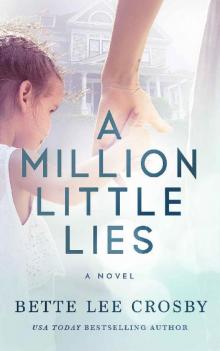 A Million Little Lies
A Million Little Lies Previously Loved Treasures
Previously Loved Treasures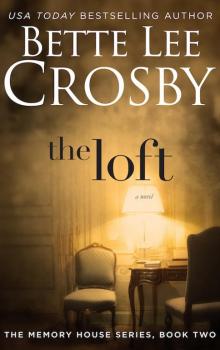 The Loft
The Loft Spare Change
Spare Change Memory House: Memory House Collection (Memory House Series Book 1)
Memory House: Memory House Collection (Memory House Series Book 1) Silver Threads
Silver Threads Wishing for Wonderful: The Serendipity Series, Book 3
Wishing for Wonderful: The Serendipity Series, Book 3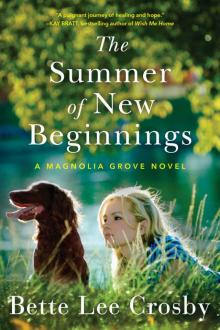 The Summer of New Beginnings: A Magnolia Grove Novel
The Summer of New Beginnings: A Magnolia Grove Novel The Regrets of Cyrus Dodd
The Regrets of Cyrus Dodd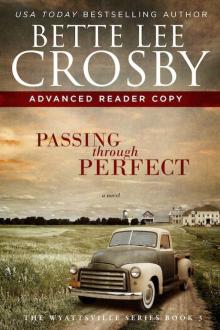 Passing Through Perfect
Passing Through Perfect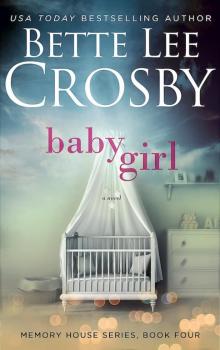 Baby Girl
Baby Girl Jubilee's Journey
Jubilee's Journey Beyond the Carousel
Beyond the Carousel What the Heart Remembers
What the Heart Remembers Cupid's Christmas
Cupid's Christmas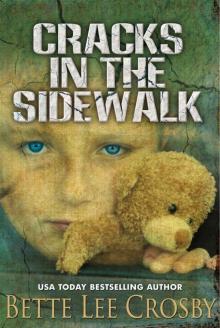 Cracks in the Sidewalk
Cracks in the Sidewalk Blueberry Hill
Blueberry Hill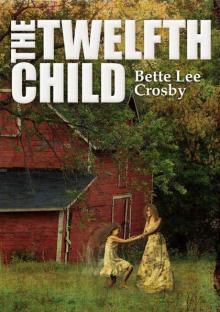 The Twelfth Child
The Twelfth Child A Year of Extraordinary Moments (A Magnolia Grove Novel)
A Year of Extraordinary Moments (A Magnolia Grove Novel)